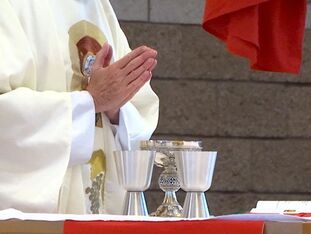 to increase and safeguard our commitment to the Lord to increase and safeguard our commitment to the Lord A few weeks ago I heard a story that impacted my reflection on the upcoming season of Lent. Told by Fr. Mike Schmitz,* it was a true story of a man in China who was willing to give up his life in order to protect a priest and thus, access to the Eucharist. His home was raided while he was hosting an ‘illegal’ Mass, and unable to escape, he was arrested and tortured terribly. Never revealing information, he was finally set free and managed to flee to America. For the first time he and his family could openly practice their faith by attending Mass daily, a luxury they did not have in China. Soon he found work and could not attend Mass daily, but went on Sunday. Then he discovered that he could make more money working weekends, and therefore stopped going to Mass regularly. Eventually he stopped going altogether, having lost the ‘habit’ of doing so. In fact, this man who had been willing to give his life to protect the Eucharist, no longer believed. Fr. Mike’s final statement was disturbing, yet clear: what the atheistic communist regime in China could not do even through torture, our secular culture did! It is shocking, but important that we recognize the strength of our culture. None of us are immune to the subtle and not-so-subtle influences that work to move us away from our Christian values, tempting us to walk away altogether. Therefore, as we enter into the season of Lent let us take the opportunity to reflect upon the pull of culture and that which we need to do to increase and safeguard our commitment to the Lord. 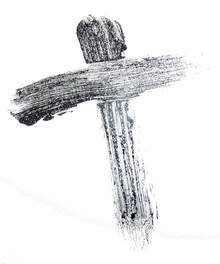 What am I willing to sacrifice? What am I willing to sacrifice? Perhaps we have never approached Lent this way, given the rightful emphasis on penitence and reflection on the suffering of Jesus. Making a sacrifice and taking the time for prayer and reflection are practices that do strengthen our faith. However, I suggest refocusing the question from ‘What will I give up for Lent?’ to ‘What am I willing to sacrifice during Lent for Jesus?’ This is about more than semantics; after all, we do not sacrifice for a season, but rather, we sacrifice for a person. In this case, that person is Jesus Christ. Thus, Lent implies more than a shift in attitude for 40 days, but rather, an impact that changes us: we leave Lent different than we ‘went in.’ The sacrifices we undertake, the sinful habits we are trying to overcome, and even the renewed prayerful practices we choose, are vehicles to Him. They are the means to an end, which is to know, serve, and love Jesus more deeply. Lent, therefore, involves pondering our lives into the future: Would I be willing to make sacrifices not only to safeguard my faith, but that of my family? Would I be willing to stand up for my faith if… no, when… challenged by the culture? (Truly, the challenges are here now.) 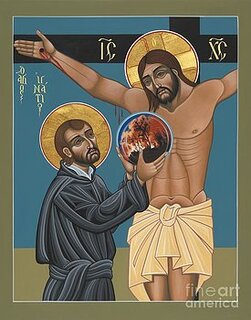 living our faith more visibly living our faith more visibly As we traverse the road with Him, what if Jesus asked for a deeper, more challenging commitment? What if He asked: “Would you give your life for me?” It is a question that should give us real pause; even if it is not necessarily about physical death, but instead implies a change of heart (conversion), it is still quite a difficult question. To ‘lay down our life’ by accepting His will (and not ours) is not at all easy because it requires taking up a newer, deeper life in Christ, leaving comfortable ways behind, and living our faith more visibly; it is about trusting Him completely. It is difficult to resist the lures of our culture which lead away from growing in Christian virtue; and it is arduous to recognize and ask forgiveness for our sinful vices, weaknesses, and behaviors so that our hearts might be purified. But we need not fear because the good news is that Jesus is with us always, giving us the graces we need to live such a courageous life.  what if we are called to reach out to someone? what if we are called to reach out to someone? In order to prepare and then enter into Lent here are some questions to consider: What if we sacrifice some of the time we spend on social media to study our faith and the Scriptures instead? What if we watched shows of value instead of spending time with movies and games filled with sex and violence? What if we became more intentional in defending or spreading the faith by not allowing those we are with to denigrate it? What if we tried something new, such as a new ministry, rather than be too fearful to leave our ‘comfort zone?’ What if we spent more quality time with our children and spouses in order to learn to be present to one another? What if we are called to reach out to someone we usually try to avoid because ‘they take too much of my time?’ All of these small sacrifices can help us to shift our priorities so that we might live for Christ, being as Christ.  Of course, not everything offered by our culture is bad; life is beautiful and we are meant to find joy in it. However, anything that pushes even the slightest wedge into our good practices and our faith will eventually tear us away from God altogether. What is important is that we put things into right perspective, discerning what leads us to God and what leads us away. The truth is that we are not called to undertake ‘heroic’ penances or any type of sacrifice simply because it is Lent. Rather, conversion deepened through our practices should open our hearts wider than they were previously so that we are willing to take the risk of loving as Jesus does. May we be willing to sacrifice, giving our lives more fully to Jesus! May we become more courageous in visibly and openly living our faith! And may we put our trust in Jesus completely! Let us pray for one another this Lent as we meet in the heart of Jesus! Peace! ©Michele L. Catanese * I was already inspired to write on the ideas in this entry, and then heard the homily by Fr. Mike Schmitz during which he shared this true story, told to him by the priest who knew the man. Hearing the story 'encouraged' me to develop my reflection. If you have not listened to Fr. Mike, he does some brilliant series' (podcasts): The Bible in a Year and The Catechism in a Year. You can find the links to both of these on my Links page (tab above). Below is the link to the homilies. https://ascensionpress.com/pages/sundayhomilies?utm_campaign=gs-2020-10-16&utm_source=google&utm_medium=smart_campaign&gclid=Cj0KCQiA54KfBhCKARIsAJzSrdo1_0Dzty3CKS2SB7BQ_Au5VhJOwESTcbzoX38lnwrkozJ5k9hHJMwaAjzeEALw_wcB Images: 1. Photo, priest praying Eucharistic prayer at Mass. 2. Clip art, Ashes. 3. Icon, St. Ignatius and the Passion of the World in the 21st Century, by Fr. William Hart McNichols. If you would like to obtain a copy you can find this icon at fineartamerica.com/featured/st-ignatius-and-the-passion-of-the-world-in-the-21st-century-194-william-hart-mcnichols.html 4. Painting, Two Young Peasant Women, by Camille Pissarro (1891-1892) 5. Painting, Divine Mercy, Jesus I Trust in You! Note: In compliance with GDPR rules, I wish to make it clear that I do not gather any information on any of my readers at any time.  we are here, keeping our hearts oriented toward heaven we are here, keeping our hearts oriented toward heaven Every so often we may hear a statement prefaced with the phrase “in a perfect world” indicating that what is to follow is not possible in this one. We know that this world, beautiful as it is, is nowhere near perfect, but even with that understanding we sometimes act as if somehow it can be made so. The world will never be perfect, and to think it could be is not only a false expectation, but it implies that we do not need the goal of Heaven since it can be perfect here. This is not our final destination; however, we are here now and so it is important to appreciate the gift of life while keeping our hearts oriented toward Heaven. Rather than throwing our hands up in despair or futility because of the suffering and darkness present in the world, we need to bring the light of Christ into this world to help people prepare for the next. Living the gospels calls us to do what we can to overcome evil and resist the degradation of Christian morals and values, to work at helping the poor, visiting the lonely, assisting the marginalized, welcoming the stranger, and bringing justice where it is absent. But expecting perfection will only bring about frustration and burnout. Only God can perfect anything, and our role is to work with Him remembering that we are not the source of grace and wisdom, but that He is. Therefore, it is better to work at being a blessing to others during our time in the world, while still keeping our eyes turned toward our true home in the perfect ‘world’ for which we yearn, that is, Heaven. 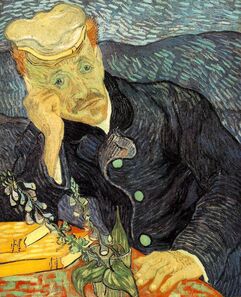 we need to accept ourselves with the same mercy the Lord does we need to accept ourselves with the same mercy the Lord does Expectations aimed at ourselves can be dangerous if they are unrealistic, especially if we ‘beat ourselves up’ when we fall short. Indeed we are to work towards perfection, but the operative word here is “towards.” Pursuit of growth in holiness is realistic, and it is our call, but perfection is for the next life, not this one. Once we get over false expectations for personal perfection and our subsequent belief that this life should be perfect, we are freer to work on getting to the life that is. In other words, we have to let go of that nagging set of expectations we have for ourselves and accept who we are with the same mercy that the Lord does. God will reveal the areas on which we need to work, and He will give us the needed graces. Our cooperation with Him will open us to greater freedom as we grow into the person He has created us to be. To be holy is to be free, and it is in this freedom that we best bring Christ into the world. 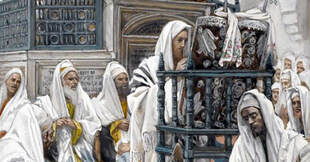 no one expected Jesus in the way He came no one expected Jesus in the way He came By holding ourselves hostage to unrealistic expectations we run the risk of (unintentionally) adopting a judgmental and/or condescending attitude toward others. If we do not measure up, they never will either. This was exactly what Jesus experienced during His ministry: His family and friends from Nazareth thought He had lost His mind, while others claimed He was possessed. They expected Jesus to be ordinary because they were ordinary. Some of the Jewish religious authorities expected a military leader like David. Even one of His own (future) apostles expressed a form of expectation when he said, “Can anything good come out of Nazareth?” (Nathaniel, in John 1:46) No one expected Jesus in the way He came; their expectations led them into narrow-mindedness and spiritual blindness. Thus, they rejected the One for whom they had waited because He did not ‘fit the bill.’ 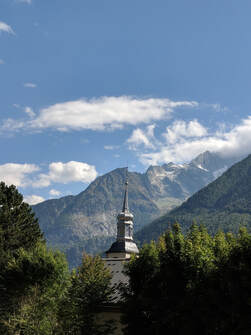 it is important to recognize the presence of God it is important to recognize the presence of God In order to prevent ourselves from falling into the same mistaken thinking, it is important to continually work on our relationship with God. He reveals Himself to us as He sees fit; He never changes, but our understanding of Him and what He desires for us will continue to grow. If we expect Him to only act in a certain way based on past experience, misinformation, or on what the enemy tries to imply is ‘true’ about Him using the pull of our secular culture to lure us away, then we will not find Him. Therefore, it is important to learn to recognize the presence of God as He has revealed Himself throughout history and how He comes to us in this present moment. It is through study of the Bible and of our faith that we can learn more about Him, and it is in our prayer that we best come to know Him. Note the distinction between knowing about God and knowing God. Both are essentially important, but it is in prayer that we cultivate our relationship with Him; we learn to recognize Him, to discern His will more clearly, experience His mercy and love more intimately, and in turn, fall more deeply in love with Him. If we actively seek the Lord, we will find Him, although not always in the ways we expect. He has promised this, saying, “When you call me, when you go to pray to me, I will listen to you. When you look for me, you will find me. Yes, when you seek me with all your heart, you will find me with you, says the Lord, and I will change your lot.” (Jeremiah 29:12-14) To desire the perfect world of the next life is our goal, but it means that in the ‘here and now’ we heed the call to grow in holiness, that is, to grow in love and mercy. If we align ourselves to Jesus and the Truth He reveals, all things are possible. 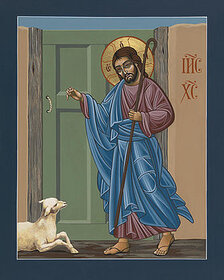 never take your eyes off Jesus never take your eyes off Jesus May we seek the Lord all the days of our life! May we strive for holiness and the freedom that it brings! May we work to better the world by being a blessing to others, revealing Christ’s love and mercy! And may we never take our eyes off Jesus, the Savior! Let us meet in the Heart of Jesus! Peace! ©Michele L. Catanese Note: As a spiritual director I must suggest a great way to get in touch with what leads to greater interior freedom: to receive spiritual direction. Because we are bogged down with a lifetime of experiences filled with perceptions both real and presumed, all of us are quite biased in how we see ourselves and consequently, how we see God. A spiritual director observes from outside those biases, and so the director can help the directee become aware of these things, helping them come to greater freedom and insight as to how God is working in them. The directee grows in greater intimacy with God through their prayer; they develop a greater understanding of God’s love and mercy extended to them, and grow in deeper love for Him accompanied by a greater desire to serve Him in order to express that love. Therefore, the person grows as a disciple, learning to discern what leads to God and what moves them away. They often begin to see God’s presence in everything, while simultaneously becoming more acutely aware of the power of sin in the world. Spiritual direction can help us to have a clearer understanding of how we are called to be His disciple in the midst of our present circumstances so as to withstand the power of evil and work toward the perfection for which we yearn. - A song I really love kept coming to mind when I was writing this, Where I Belong by Building 429. Here is a link to a video of them performing it: https://www.youtube.com/watch?v=he32vwlKQPY Images: 1. My photo, taken in Dunedin, New Zealand. 2. Oil painting, Portrait of Dr. Gachet (first version) by Vincent van Gogh (1890) Of this the artist said, "I've done the portrait of M. Gachet with a melancholy expression, which might well seem like a grimace to those who see it." (Vincent in a letter to his brother Theo) 3. Painting, Jesus Unrolls the Scroll in the Synagogue, by James Tissot. Jesus was not accepted in Nazareth after he did this in the synagogue there. 4. My photo, the Alps near Chamanix, France. 5. Icon, El Buen Pastor by Fr. William Hart McNichols. You can find this icon at https://fineartamerica.com/featured/el-buen-pastor-188-william-hart-mcnichols.html Note: In compliance with GDPR rules, I wish to make it clear that I do not gather any information on any of my readers at any time. |
Heart Speaks to Heart
|

 RSS Feed
RSS Feed

